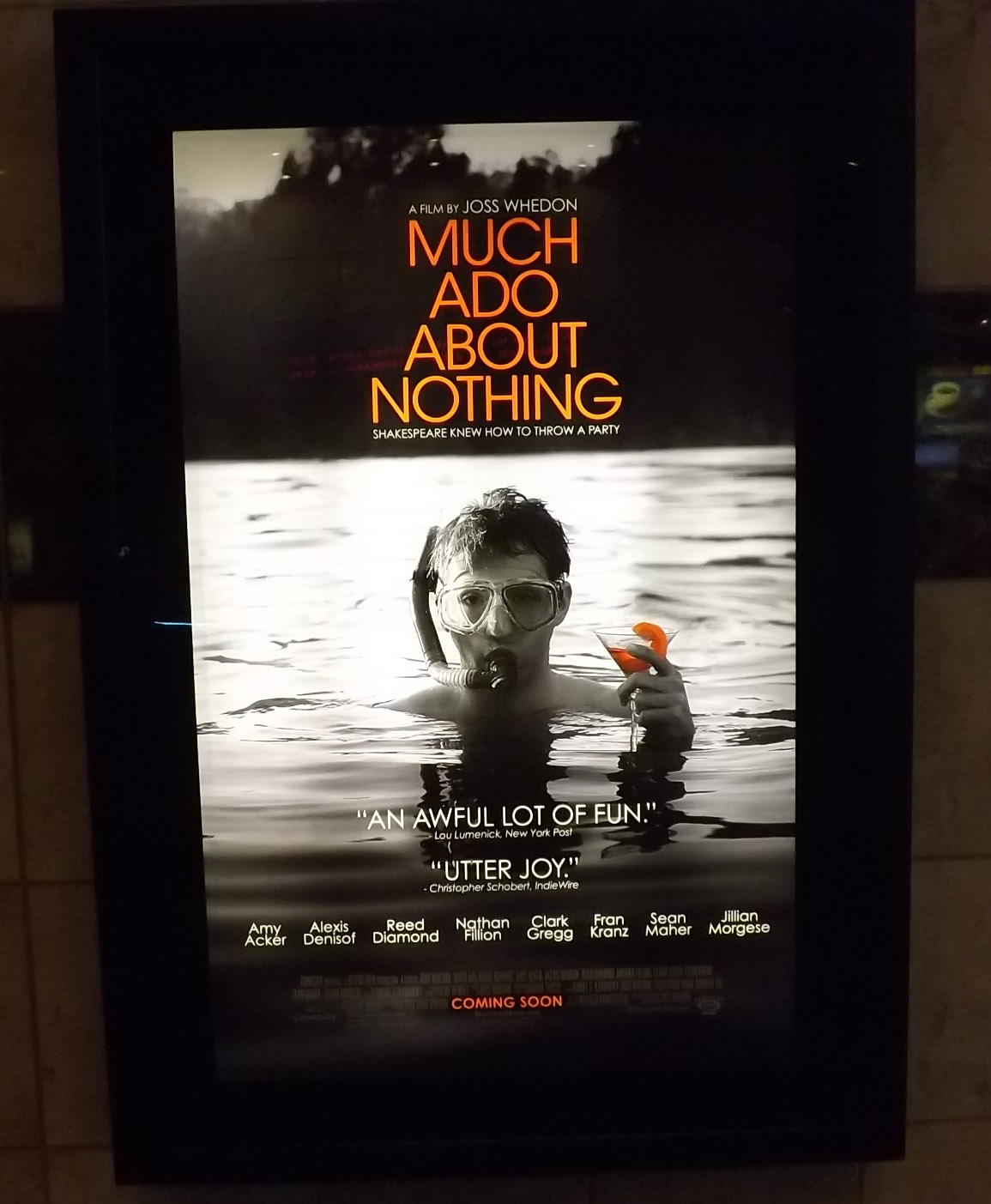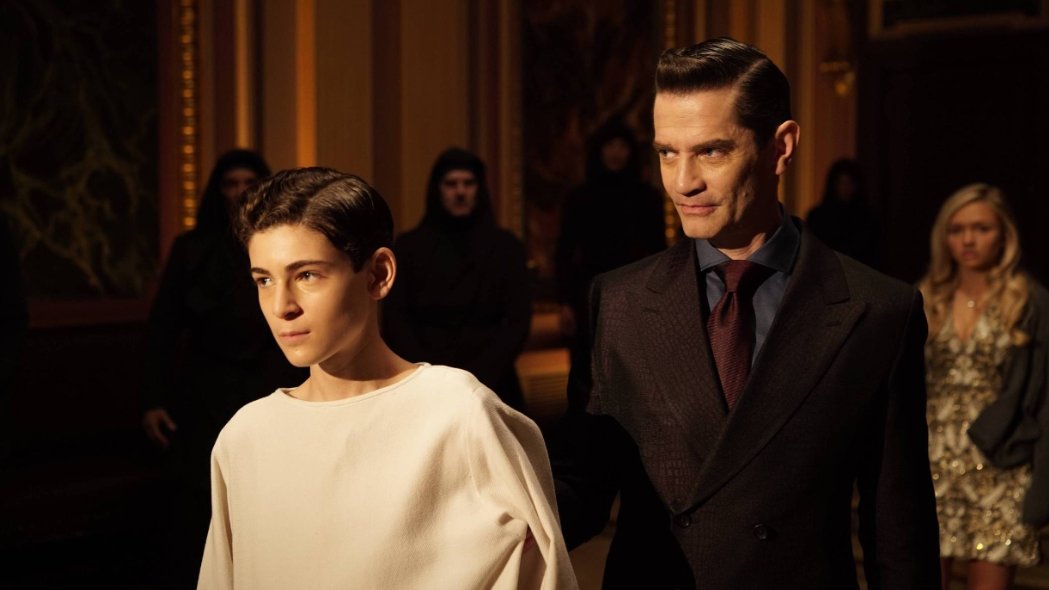Five theaters, 183 thousand dollars. That’s a good start for Joss Whedon’s version of Much Ado About Nothing.
Still, what’s so special about it? A lot, and a lot of fans agree. More after the jump.
I’ve seen the movie twice, which is more than most people. I would’ve reviewed it after the showing at the San Francisco International Film Festival, but the organizers suggested I shouldn’t. That’s why I waited until now.
It’s been well-received by critics, and certainly the public. There’s been some people who didn’t like it because maybe the leads were miscast, they didn’t feel the story, or that maybe the production was rushed. One critic suggested that setting the movie at a house in Santa Monica doesn’t make sense. It should have been in Italy, like Kenneth Branagh did.
It’s better to look at what Joss did, how he did it, and what he’s trying to say. After doing readings at his home for years, he wanted to make his own version of a Shakespeare classic. It’s like having a book club, and deciding to have your members film a version of their favorite writer at your house. This difference is the members are well-known actors, and the budget is equal for a couple of days of craft services for the production of Man of Steel or Pacific Rim. Besides, he calls it a way to relax.
He has made a good film with a modern spin on age-old questions about love, and just getting along. He also wears many hats: adapting the original text, directing, co-editing, and even composing the music.
The early scenes show the story is timeless, whether it’s the 16th century or 2013. First, there’s Benedick slowly trying to leave Beatrice’s house after a one-night stand that both wanted to cut short. You can see the disappointment in their faces. Then, Benedick comes back with a beard, after a glorious victory. He’s decided that war is better than romance, which explains why he likes to quarrel with Beatrice. She makes sure, though, that she can dish it out, too. That’s followed by the defeated Don Julio handcuffed in a zip-tie. Once the characters talk in verse, and the viewer gets in the rhythm, it seems natural.
From there, it’s a story about love from two perspectives: a couple of former lovers who have to be tricked into falling back into love, and a couple whose love is tested by false scandal.
Many enjoyed seeing Amy Acker and Alexis Denisof as Beatrice and Benedick, and not just because it game them flashbacks of Wesley and Fred on Angel. Despite their bickering, you could see he wants to try again, but doesn’t exactly know how. It has  to take some trickery from Don Leonato and Claudio to do it. It’s no coincidence that once he thinks Beatrice loves him, he’s clean-shaven again, and dressing better. As for Beatrice, her disappointments with men, Benedick especially, tempers her attitude. However, when Hero and a maid claim Benedick really loves her, she stumbles into slapstick to hear more. It looks like the speech has worked…until Claudio rejects Hero at the altar. Then, her negative attitudes towards men are revived. It will take a few more things, including two tossed-aside sonnets, to set things right.
to take some trickery from Don Leonato and Claudio to do it. It’s no coincidence that once he thinks Beatrice loves him, he’s clean-shaven again, and dressing better. As for Beatrice, her disappointments with men, Benedick especially, tempers her attitude. However, when Hero and a maid claim Benedick really loves her, she stumbles into slapstick to hear more. It looks like the speech has worked…until Claudio rejects Hero at the altar. Then, her negative attitudes towards men are revived. It will take a few more things, including two tossed-aside sonnets, to set things right.
As Hero, Jillian Morgese looked more like part of the background than an important character. She is just a pawn in Don Julio’s plot. This changes when she is able to spin a tale of love that convinces Beatrice, and when she is wronged at the altar. That’s when Hero becomes more, well, hero-ic, when she hopes Claudio repents. Fran Kranz, best known in Dollhouse and The Cabin In The Woods, is great as the lovestruck Claudio. He may love Hero, but it’ll take him quite a while to realize what that really means.
Sean Maher as Don Julio is the definition of fashionably evil. After losing a battle to Don Leonardo, he decides to strike back, using Hero. The best example is when he appears just after Don Leonardo and Claudio congratulate themselves for getting Benedick and Beatrice together. The moment of triumph is taken away by Don Julio’s claim that Hero is unfaithful, spoken in soft words. After he ruins the wedding, he steals a cupcake and walks off. Now that’s evil.
Nathan Fillion and Tom Lenk nearly steal the play as Dogberry and Verges, with their version of Law and Order: Messina. They’re able to mix Shakespeare with TV drama clichés, with a little comedy. When they kept putting on their sunglasses, I couldn’t help but think “David Caruso”. Still, they do get to the bottom of Don Julio’s actions, even though one of them is called an ass.
Of course, we can’t forget Clark Gregg as Don Leonardo. He’s great as a proud papa to Hero, then wounded by Don Julio’s plan to ruin Hero’s reputation.
What’s also impressive is how Shawna Trpic uses wardrobe to show character development. Note how the wardrobes of Beatrice, Benedick and even Hero change with their moods. I also include Conrad, played by Riki Lindholm. We see her in a sexy dress with Don Julio, then she changes to a black skirt and striped jumper when she is in the middle of smearing Hero’s reputation.
On a scale of one to four Shakespeare busts, I give it three and a half. For a micro-budget and twelve days of filming, Joss Whedon proves to many people, especially those who were never interested in Slayers, Browncoats or Avengers, that he is a very good filmmaker.
One thing, though…would this tempt JJ Abrams to also film Shakespeare? Maybe The Tempest, with his old pals from Lost?










